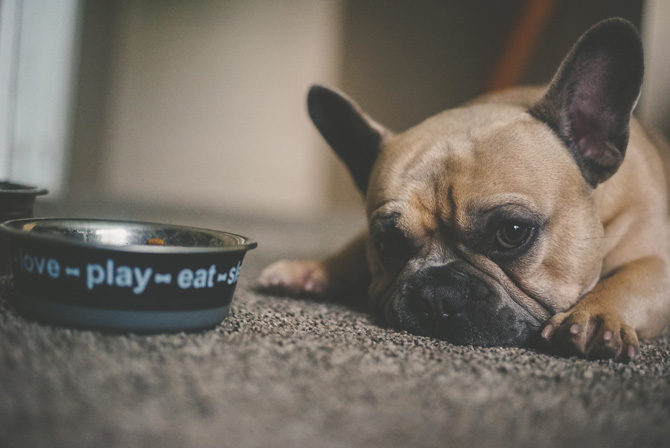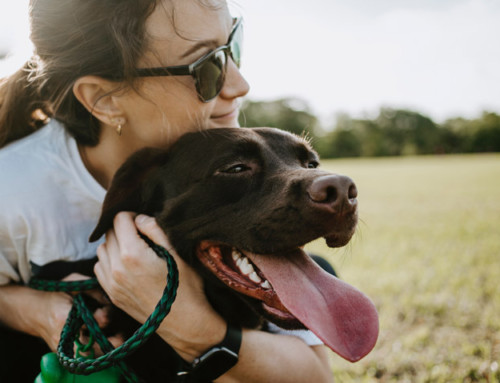Now that Rover’s reached adulthood you’ll want to make certain that his diet is nutritious enough to keep his body in peak condition and avoid doggy obesity. After all, knowing the right things to feed an adult dog will help keep your fur pal happy and healthy.
To keep your dog feeling pawsome he’ll need a balanced diet (just like us!). This will give him the right amount of proteins, carbohydrates, vitamins, minerals, fats and oils.
A high quality, premium pet food should supply your adult dog with all his or her nutritional needs. Just remember to look for pet food that’s aimed at your dog’s size, breed and age. Whether you decide on wet or dry pet food might be determined by your budget and dog’s preference. However, when choosing what to feed an adult dog, be sure to read the ingredients list to ensure you make a well-informed choice on which is right for your furry friend.
Is your dog’s diet meeting his nutritional needs?
When considering what to feed an adult dog, it pays to assess whether your dog is currently getting everything he or she needs from its food. It’s also worthwhile looking at his or her body condition. The following questions can be useful in helping to assess your dog’s current nutritional status.
Has its shape or size varied?
Does it look like a healthy weight?
Is it as active as it’s always been?
Is its coat glossy?
Are its eyes clear?
These are just some of the questions you can keep in mind to ensure your dog is healthy and satisfied nutritionally.
How much food should you feed an adult dog?
Depending on the size and breed, adult dogs only require 1-2 feeds a day. If unsure, consult your vet. A key indicator that you are overfeeding your dog is if they are not eating all the food you give them—or they’re starting to look like a fatty boom bah! In this case, reduce the amount of food you’re feeding Rover.
According to PetMD, here’s how much you should feed your adult dog:
- Medium dogs, 15 kilograms: 1 ¾ cups of dry food per day, or around 780 calories.
- Medium dogs, 25 kilograms: 2 ½ cups of dry food per day, or around 1100 calories.
- Large dogs, 30 kilograms: 3 ½ cups of dry food, or around 1300 calories
TIP: Using the same container or cup daily to measure out your dog’s food can help ensure the amount you feed them is consistent.
What exactly should you feed an adult dog?
While our furry friends might give the impression they’ll happily eat anything and everything, certain foods are better than others. It can be useful to consider what a wild dog would eat.
Wild dogs eat the raw meat and bones of their prey. They also eat some vegetation and scraps they scavenge. Nevertheless, for domesticated dogs, the RSPCA recommends high-quality premium-grade commercial food that is appropriate for your dog’s life stage and health status.
You can also combine commercial dog food with natural, human-grade food. For example, you can offer raw meat (e.g. lamb or beef), raw meaty bones (no chicken bones though) and vegetables.
It is recommended that you do not feed your dog sausages, sausage meat or deli meats, such as salami, because these contain large amounts of preservatives.
Dog feeding tips
Food that has reached room temperature is much tastier than fridge temperature food and is easier for your dog to digest. Just make certain you don’t leave food out so long that it spoils, and keep it covered.
If your dog prefers moistened food, rather than dry, you may need to also include a dental treat to help keep your dog’s teeth free from plaque.
Don’t feed your dog just before a car journey. Need I say why!
Allow your dog time (30-60 minutes) to digest its food before you take it for a walk or run.
If Rover deserves a reward, go right ahead but remember—not too many treats. You don’t want Rover turning into a roly-poly. If you’re giving treats, consider reducing the portion size of the next meal.
What to feed an adult dog as a treat
Dog treats and human treats should not be the same. For example, never give your four-legged friend chocolate—unless it’s specially formulated dog chocolate. (Seriously though, who would want to share their chocolate?) Instead, try:
- Raw, meaty bone
- Liver bites
- Fruits like apple (core removed), banana or watermelon
- Yoghurt (such as natural Greek yoghurt)







Leave A Comment